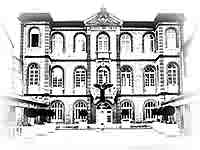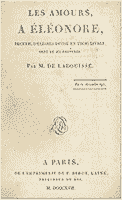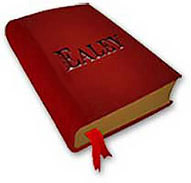LABOUISSE-ROCHEFORT (JEAN-PIERRE-JACQUES-AUGUSTE DE), writer, born in Saverdun, a small town in the department of Ariège, 14 July 1778. His father, Jean, was an equerry, Knight of St. Louis, and Coseigneur [joint lord] of Saverdun; his mother, Anne de Bonaffos, the daughter of Baron Jean-Pierre de Bonaffos, Lord of Latour.
Young Auguste lost his father at the age of four. His three sisters died in infancy, leaving him an only child to a mother who found him a constant source of joy and comfort.
He was first educated in Montreal, near his grandfather, Baron de Bonaffos; later he entered the Royal Military School of Sorèze. The Revolution soon interrupted his studies and forced him to return to the maternal home. He was only thirteen years old.
During the Terror Labouisse and his mother were arrested and taken to Pamiers. The latter was imprisoned in the town college, and the young Auguste in the old Carmelite convent. The poor boy fell dangerously ill. A bribe got him secretly carried away to Madame de Labouisse, to the women's prison, where he remained hidden for some time.
He was discovered by a man whose honour and life Auguste's father had once saved, and was placed by him on the list of unfortunate men who were to be sent to Nantes and drowned in the Loire. Just as he was about to leave, the People's Representative of Paganel came to inspect the prisons of Pamiers. Outraged at finding so young an inmate (Labouisse was then not yet fifteen years old), he freed him. His excellent mother was also freed, but on condition that they both remained at least twenty leagues from Saverdun. Labouisse submitted without a murmur.
Soon tired of this exile, however, he returned unannounced to his birthplace, and courageously presented himself at the town hall to annul the clause which banned him from his country. In a small town where, you could say, he found as many friends as inhabitants he had no trouble winning his case. After his return, the young Auguste began his literary studies, studies which would become a true life-long passion.
At the age of eighteen, he visited Paris for the first time, where his devotion to the royalist cause brought him into great danger. He threw himself into the Clichean party, of which Pichegru would become leader. One day, ordered on counter-patrol, he and twenty others were arrested in possession of weapons and led, drums beating, to be shot. He was marching with a heavy heart between a double row of soldiers, when one of his companions, a robust and courageous Vendée officer, took his arm and squeezed tightly. Guessing his intentions, Labouisse watched what he did. All of a sudden, as he passed a narrow, dark street, the officer threw himself at a soldier, knocked him down, broke the line of guards, and six prisoners immediately escaped. They were pursued for half an hour, but to no avail ... Labouisse was saved.
What became of those other youths?
Miraculously freed, Labouisse managed to get through the Paris barricades and took refuge in the forest of Sénart with his companions in misfortune. He was there for several weeks, returning to the capital only when he judged calm to be restored.
Somewhat cured of his political fever, but always eager for thrills, the young Auguste now allowed himself to be led by his passion for literature. He completed his studies, and soon became an author. In 1797 he published his first verses in the Courrier des Spectacles [Entertainment Mail], of which Lepan was the owner. Later he wrote various articles for the same publication, and liaised closely with its principal editors, Legouvé, Vigée, and Clement de Dijon. He also wrote for the Ami des Arts [The Arts' Friend], a daily newspaper soon suspended by the Directoire; the Mercure de France [French Mercury], the Magasin Encyclopédique [Encyclopedic Journal] and the Annales de la Littératur [Literary Annals].
Labouisse's parentage and fortune facilitated his interests: he had no difficulty in forming relationships with the most remarkable writers of the period. Among his papers are quite intimate and flattering letters from Bernardin de Saint-Pierre, Boissy d'Anglas, Carion de Nizas, Chateaubriand, Dugas-Monbel, Duval, de Feletz, Ferlus, de Fontanes, Alexandre Guiraud, Kérivalent, Lacépède, Mercier de Compiègne, Mollevaut, Noël, Parny, Peignot, Abbot Sabathier de Castres, Abbot Sicard, Baron Trouvé, Tréneuil ...
At the very beginning of his literary career, aged eighteen, our young man published a Dissertation contre le divorce [Dissertation Against Divorce], which he signed A. DE L.-R. Three years later, he produced the first edition of his Pensées [Thoughts]. This last work began his literary reputation, and was especially remarked for the youth of its author.
In 1802 Labouisse went to Toulouse, where he married Mademoiselle Eleonore Muzard de Saint-Michel, a Creole, born in Ile de France [Mauritius]. She had left there early in her life due to family misfortune, and was raised on the continent. To a remarkably pretty face and a cultured education, Eleonore added the rarest qualities of mind and heart. She wrote poetry characterised by naturalness and ease.
Labouisse depicted this notable woman in the second edition of his Pensées under the name of Celimène, and in the third under the name of Sophronie. He dedicated his Elégies to her and his principal works, devoting a veritable cult to her. He speaks of her in both prose and verse and, never afraid of repeating himself, in most of his writings.
Eleonore's father had at one time possessed considerable wealth valued at nearly two million, but fortune is fragile, fortuna vitrea est [fortune is glass]. The revolt of the Negroes in St-Domingue [Haiti] destroyed almost all his property, and brought him to the brink of ruin. At the time of his daughter's marriage, Monsieur Muzard still had a house on the Ile de France, which he sold for a hundred thousand francs. This sum was sent to him divided between four ships, all of which were captured by the English.
Monsieur Muzard was driven to taking out loans; Labouisse came to his rescue, paid his debts, and ensconced him in his own home, along with his mother-in-law, thus ensuring the happiness of the whole family. These sacrifices further reduced his wealth, which had already been shattered during the Revolution by a redemption of forty thousand crowns in assignats. It was then (1810) that he accepted a fairly lucrative position in the tobacco office.
Labouisse was living a quiet and happy life in the midst of a charming family, surrounded by many friends, devoting himself entirely to his literary pursuits, when, one after the other, he lost three of his children, and very soon afterwards his much-beloved Eleonore.
On top of these cruel sorrows came tribulations of another sort. His fortune, considerably reduced, as we have seen, by the redemption of assignats and by the sums given to his father-in-law, was further diminished by the loss of his position (1850). His political opinions had induced him to refuse to take an oath. To make up the loss, Labouisse resolved to engage in financial speculations; they were all unfortunate.
In the last days of his life, threatened with the loss of a considerable debt, he took charge of a printing-house in Toulouse, and became a businessman, you might say, in spite of himself. To possess this establishment in its entirety, he found himself obliged to pay a large sum; hence more debt, more difficulty, more grief. From this moment on the life of Labouisse was one sorrow after another.
His piety, which was firm and sincere, and the love of his children supported him during these most painful times. Courage never failed him. His character, naturally impulsive, underwent a complete and radical change; he became the gentlest and most resigned of men. Great misfortune finds in religion consolation and succour which it seeks in vain among men.
Towards the end of his days, one could not watch without a cruel pang this unhappy old man, once so wealthy, now infirm, grieving, dispirited, enduring sleeplessness and privation, without ever uttering a bitter word or a regret, holding back tears, redoubling his work, making mistakes, thinking of his daughters and regaining courage, turning to something else, making another mistake, and thus, with struggle after struggle, exhausting what little breath he had left.
Labouisse died at Castelnaudary, February 22, 1852. Monsieur Metge presented a eulogy for his compatriot at the Academy of Sciences, Inscriptions and Belles-Lettres of Toulouse, of which our poet was an affiliate. This eulogy has not been published.
Labouisse founded in Castelnaudary a philomatic society, which he chaired for several years. He was an associate of the Literary or Scholarly Academies of Abbeville, Agen, Amiens, Auch, Besançon, Béziers, Caen, Cambrai, Carcassonne, Châtellerault, Colmar, Dijon, Foix, Gap, Granville, Lyon, Marseille, Montauban, Montpellier, Nancy, Nantes, Narbonne, Nîmes, Perpignan, Poitiers, Rennes, Rouen, Sorèze, Strasbourg, Tours and Vaucluse.
Labouisse was an assiduous and prolific writer. The list of his publications is considerable, as can be seen at the end of this article, and he left several manuscripts in longhand. He has a lucid, fairly conventional style, sumptuous, sometimes a little flaccid. He wrote quickly, piling on the adjectives, abusing quotations, never revising his work. The most highly regarded among his poems, with universal consent, are his Elegies and his Idylls. They have elegance, finesse and feeling. His letter entitled My Forty Years can be read with pleasure. His Voyages à Trianon [Journey to Trianon] and à St-Léger [at St-Léger], Bouffiers' campaign, provide both pleasure and variety. In his Pensées, in fairness, there is sometimes a felicitous passage, but in general little profundity. His Lettres biographiques sur Maynard [Letters on Maynard] contain unbiased assessments and several interesting facts. His Mélanges [Miscellany], Souvenirs [Memories], and Rêverie [Reveries] offer here and there curious details and striking anecdotes. He reviews the literature and writers of the Directoire, the Empire and the Restoration.
He returns to the same subjects in the most considerable of his works, Trente ans de ma vie (de 1792 à 1826) ou Mémoires politiques et littéraire [Thirty years of my life (from 1792 to 1826) or Political and Literary Reminiscenses]. This last collection, consisting of eight volumes and published in 1846, reflects the advanced years, misfortunes and preoccupations of poor Labouisse. It would be unfair, however, not to forgive its lapses and occasional dullness. It must not be forgotten that Labouisse was at the same time author, publisher and printer of his work.
Our poet has been reproached for having yielded too readily, at the start of his career, to the somewhat loose tendencies of the age, particularly to the influence of Parny. But the more or less light works of his youth, ultimately very honest and upstanding, do not suggest either easy morals or a corruptible heart. Besides, the author did admit to such failings, and even publicly reproached himself for them.
Labouisse described in all its details and sang in every mode his constant love, sincere and passionate, for Madame de Labouisse, for his adorable Eleonore, and so often rhapsodised his happiness, the equal of no other, that he attracted more than once a smile, and even mockery from those sceptical and malicious minds who were no doubt less appreciated than he. In such circumstances, he was perhaps too sensitive to the minor buzz of criticism, to which he thought it his duty to answer seriously, at length, as one would respond to a relentless attack. The poet was naturally irritated, but the husband exacerbated this irritation; for the defender of Eleonore felt great sword-stabs where others would have registered only imperceptible pinpricks.
Labouisse was of an open, sound character, with affable and graceful manners, and a mind that was observant, refined and sometimes innovative. He was convivial, but with an air perhaps of being solemn. His rosy complexion, blue eyes and wondering smile gave a sweetness and naivety to his expression. There was a reserve and shyness about him which perhaps hindered success in the wider world, but which never prevented him from shining in a small circle of friends.
He had witnessed much and remembered much, and could converse very agreeably; but when in his books the question of politics arose, despite a great fund of bonhomie and indulgence, he was dominated by his convictions, seemed to doubt the good faith of his adversaries, and fought them to the extreme, pronouncing what he he believed to be truths with a rudeness he supposed to be frankness. Some pages in his Mélanges present a striking contrast to his sweet character and urbane conversation.
Studying had always been the delight of Labouisse. Reading was his favorite occupation. He read incessantly, even at the table and in bed, pen or pencil in hand, jotting excerpts or remarks on squares of paper, which he would later classify in his own way, and which he knew how to find if need be, aided by his system and better still by his prodigious memory.
He had accumulated a considerable library, the finest in his native city, and a collection of autographs which included the principal writers of the last century and the first twenty-five years of this one.2
Labouisse was a modest man, such is the opinion of all who knew him, but some critics, a bit harshly, reproached him for having let slip too often, in his writings, a sense of his own merit. This habit had its source in the real successes of his first publications and in the respectable encouragement of several great writers, contemporaries, and friends.
Let us hasten to say that when this excellent man indulges in the sweet illusions of amour-propre, he expresses himself with so sincere a conviction, with a good faith so candid, that one soon overlooks it, willingly excusing the “I”s and “me”s, which flow too often from his pen. It is the same disposition of mind as that which impelled him many times, especially in later life, to publish mediocre essays, including those of his best friends. Should the settlement of a bankruptcy which had contributed to his ruin and the report of a malicious trial whose consequences he exaggerated have remained in his portfolio? Could his wife's household occupations and his son's college successes, no doubt very interesting for him and his family, hold the same appeal for the public?
It was well known that Labouisse liked to oblige, and his acquaintance was often abused. It may be stated, without fear of contradiction, that the generosity of his character played a large part in the dissipation of his fortune.
We can also state that, never suspecting the nasty side of men and the world, he could not be sufficiently distrustful of even the most mendacious promises of speculative finance, and that his imprudence caused as much harm to his business enterprises as the natural bent of his mind. The sentiment of honour and delicacy, hereditary in the family of Labouisse, was borne by him to a very high degree. A man from the good old days, a stranger to business, not understanding the Positivism of this century, he might possess the ideals, the soul, the recklessness of the poet, but must necessarily be a dismal entrepreneur.
Here is a list of the main works by Labouisse-Rochefort:
Réflexions contre le divorce [Thoughts Against Divorce], 1797, in-18; [Translation here]
Pensées, observations et réflexions morales, politiques et littéraires [Thoughts, Observations and Moral, Political and Literary Reflections], 1800, 2 vol. in-16; second edition, 1809; third edition, 1810;
Articles in l'Ami des arts [The Arts' Friend] and le Courrier des spectacles [The Entertainment Mail], de 1797 à 1800;
Calendrier d'Eléonore, recueil de pièces fugitives [Eleonore's Calendar, a Collection of Fugitive Pieces], 1805, in-12;
Various Analyses in la Revue [The Review], le Mercure de France [The French Mercury], le Magasin encyclopédique [The Encyclopaedic Journal] and les Annales de la littérature et des arts [Annals of Literature and the Arts], de 1804 à 1810;
La Contre-satire [Against Satire], followed by diverse poetry, 1804, in-18; [Translation here]
Voyage à St-Maur [Journey to St. Maur], Promenade à Longchamp [Walk to Longchamp], followed by some pamphlets of poetry, 1807, in-16;
Idylles, imitated from the Italian cantatas of Metastasio, followed by the first book of Amours, to Eleonore, 1808, in-16; [Translation here].
Edition of OEuvres de Venance [Works of Venance], 1810. The proceeds of this edition were given to the widow of this unfortunate man.
Mélanges littéraires [Literary Miscellany] or Lettres sur l'éducation, sur les romans, sur Martial, sur Catulle [Letters on education, novels, Martial, Catullus]. 1813, in-16 ;
Petite brochure sur les événements du jour [A Short Brochure on the Events of the Day], 1814 ;
L'Eléonoriana, biographies about famous Eleonores, 1814, in-16;
Supplément de l'Eléonoriana [Eléonoriana supplement], 1815, in-16;
Première lettre aux Français : seconde lettre aux Français, suivie de la réfutation d'un prétendu rapport du duc d'Otrante [First letter to the French: second letter to the French, followed by the refutation of an alleged report of the Duke of Otranto], 1815;
Voyage à Trianon, suivi de Pièces fugitives et du Voyage à Montrouge [Journey to Trianon, followed by Fugitive Pieces and Journey to Montrouge], 1817, in-8º;
Les Amours, à Eléonore, a collection of elegies divided into three books in-16;
Essai sur la culture de la vigne et de l'olivier [Essay on the Cultivation of the Vineyard and the Olive Tree]. 1819;
Mes quarante ans [My Forty Years], Epistle, 1819;
Épigrammes choisies d'Owen [Owen's Selected Epigrams] translated into verse, posthumous work of Kérivalent, his friend, 1819;
L'Anecdoctique, weekly newspaper, Castelnaudary, from 1821 to 1824 and from 1842 to 1844;
Discours sur la naissance du duc de Bordeaux [Discourse on the birth of the Duke of Bordeaux], 1821;
Souvenirs et Mélanges littéraires, politiques et biographiques [Memories and Literary, Political and Biographical Miscellany], 1826, 2 vol. in-8º;
Voyage à St-Léger [Journey to St. Léger], Mr. de Boufflers' campaign, followed by Voyage à Charenton [Journey to Charenton], 1827, in-8º;
Petit Voyage sentimental [Short sentimental journey] followed by the second edition of the Promenade à Longchamp [Walk to Longchamp], 1828;
Encore un mot sur les femmes [Another Word about Women], report made to the philomatic society of Castelnaudary, 1850, in-8º;
Voyage à Rennes-lès-Bains [Journey to Rennes-les-Bains], Castelnaudary, 1832, un gros vol. in-8º;
Mélanges politiques et littéraires [Political and Literary Miscellany], following the Voyage à Rennes-lès-Bains, Castelnaudary, 1834, in-8º;
Almanach religieux et littéraire [Religious and Literary Almanac] for 1845, by a society of men of letters, Toulouse, 1845, in-18;
Lettres biographiques sur François Maynard [Biographical Letters on François Maynard]. Toulouse, 1846, in-18;
Trente ans de ma vie, de 1792 à 1826, ou Mémoires politiques et littéraires, [Thirty Years of My Life, from 1792 to 1826 or Political and Literary Memoirs], Toulouse, 1846, 8 vol. in-8º [Volume 2; Volume 3; Volume 4; Volume 5; Volume 6; Volume 7; Volume 8];
Mes Réveries et mes Confidences [My Dreams and My Secrets], Toulouse, 1850;
Variétés littéraires et biographiques [Literary and Biographical Selection], from the newspaper entitled l'Echo judiciaire [The Judicial Echo], Toulouse, 1851, in-18.
![Noyades de Nantes by Jean Duplessis-Bertaux (c. 1747-1820) ([Public domain], via Wikimedia Commons) Noyades de Nantes by Jean Duplessis-Bertaux (c. 1747-1820) ([Public domain], via Wikimedia Commons)](Images/nantes.jpg)
![Jacques-Henri Bernardin de Saint-Pierre on Britannica.com Engraving of Bernardin de Saint-Pierre, 1818, by Étienne-Frédéric Lignon, ([Public domain] via Wikimedia Commons)](Images/bernardin.jpg)




